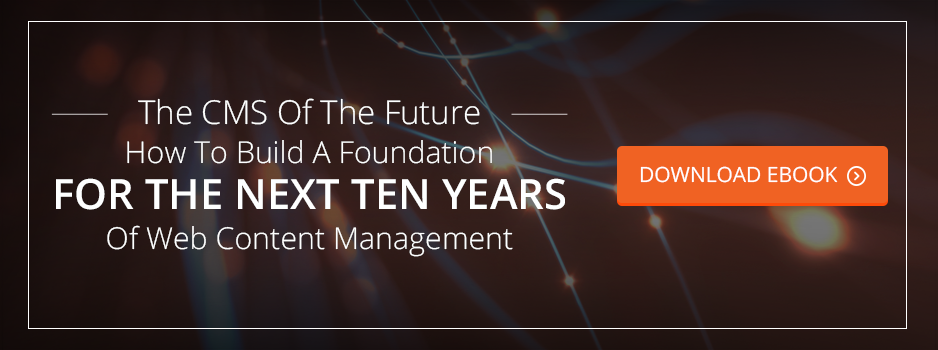Technology has evolved in leaps and bounds over the past decade, and it will continue to grow exponentially. This is especially true of tech that drives the Web.
As such, companies face the challenge of deciding where to invest their technology budget, knowing full well that everything could change on a dime. There is a need to keep up with the latest technology, but investing in every trend that comes along or in technology that becomes obsolete within a year can wreck your bottom line.
A content management system (CMS) is no different. As your company evolves, your website needs will change; new applications will need to be integrate and new functionality will need to be added. And let’s not forget how often security measures must be updated and tightened as new threats arise.
So how long can you expect your website’s CMS to last before it needs to be changed or overhauled? And is there a solution that can stand the test of time?
Weighing Your Options
Companies often choose from two general categories for their CMS: custom or out-of-the-box.
Open-source, off-the-shelf options like WordPress or Drupal are available for free and are developed by a community of volunteers. They offer out-of-the-box installation and flexibility. In fact, over 74 million sites are managed using WordPress.
However, technology investment is about more than just the up-front costs, as the lifespan has to be considered. Just as you’d expect a good ROI from automation software or advertising, you want to make sure you’re getting enough bang for your buck out of your CMS. So when you must continually sink time and money into customizing and updating your site, the low cost of entry at the start becomes moot.
Can you afford another CMS conversion when the lifespan of your open-source CMS runs out? Look beyond the most popular option. Each business is unique and using the popular option may not be the wisest technological investment.
The Advantages Of Going Custom
Many companies opt for an off-the-shelf CMS like WordPress, Drupal or Joomla. While these content management systems might seem like a quick and inexpensive answer to your technology needs, these options only provide a temporary solution.
Companies often find themselves saying, "It won't let us do that" or "That will cost extra" soon after installation. Although the upfront costs were less, you may soon find the lifespan of your open-source CMS is fairly short-lived.
CMS Critic compares content management systems to "a living, breathing, sweating, working, pulsating living being." In other words, it must be able to grow and adapt. Open-source platforms do receive regular upgrades, but users are at the mercy of the developers. The specific needs of your business are no more important than the needs of the millions of other businesses using the product.
Conversely, a custom CMS not only provides for your immediate needs, but is adaptable for future expansion. No technology lasts forever. However, a custom CMS typically lasts five to seven years. Often, companies need a major website redesign before they outgrow their custom CMS.
In fact, investing in a custom CMS will help increase the lifespan of your website. If new functionality is needed, a custom CMS can be adapted to meet those needs. You'll never hear, "We can't do that" from your custom CMS developer.
Two Ways Lifespan Is Increased When Going Custom
There are two major reasons a custom CMS will increase the lifespan of your investment.
- It changes with your workflow. All companies adapt and evolve. As your services change, your workflow does too. The design of a custom CMS is determined by the workflow of your business. If you require additional software or functionality, it can easily be integrated. You’re not limited by the rules of a CMS developed by someone who does not know your business.
- The code is simplified. Open-source CMS developers must try to think about the needs of millions of users. Because a custom CMS is designed specifically for your business, it does not need the extra code for all possible scenarios. A simplified code is easier to adapt, decreases site loading time, and makes troubleshooting easier.
At the end of the day, out-of-the-box platforms work well enough for businesses that don’t intend to grow or expand. But for those anticipating rapid or drastic growth over time, a scalable solution is an absolute must—and that’s where a custom CMS comes in handy.



